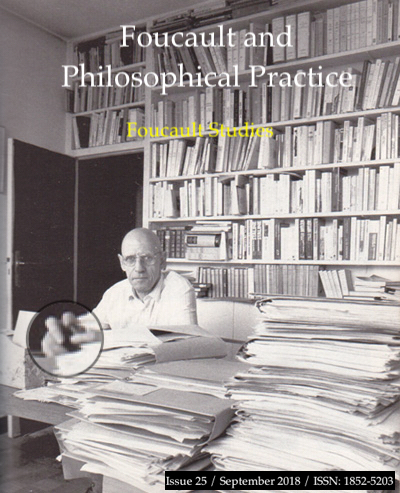Listening to Unreason: Foucault and Wittgenstein on Reason and the Unreasonable Man
DOI:
https://doi.org/10.22439/fs.v0i25.5581Keywords:
Foucault, Wittgenstein, Descartes, reason, the reasonable man, person, déraison, madness.Abstract
In this paper I examine Wittgenstein’s appeals to madness in On Certainty in light of Foucault’s Histoire de la folie. A close look at these works, usually conceived as disparate, belonging to entirely different schools of thought, reveals they actually have much in common. Both can be read as investigations into the grounds of reason, and while they offer quite different and distinct perspectives on the matter, they share some central insights. In both we find that the boundaries of reason are not only vague but also largely founded upon the relations - social in Foucault, socio-linguistic in Wittgenstein - between the reasonable person and the unreasonable person. Both perspectives reveal a curious state of affairs whereby the reasonable person is the one who dominates discourse, and yet, in his claim for reason, remains forever dependent upon the unreasonable person and his rejection. The pressing question triggered by Foucault's account is whether the boundary between reason and unreason is at all necessary. This undermines Wittgenstein’s thesis that this boundary is a matter of logical necessity upon which discourse depends. I flesh this point out in the paper also by examining the differences in Wittgenstein’s and Foucault’s treatments of Descartes’ Meditations. I conclude that Wittgenstein’s criticism of Cartesian skepticism presented in On Certainty loses much of its fortitude once examined in light of Foucault's Histoire de la folie.
References
Baker, G.P. and Hacker, P.M.S., Wittgenstein: Rules, Grammar and Necessity, vol 2. Oxford, UK: Wiley-Blackwell, 2009.
https://doi.org/10.1002/9781444315691
Boyne, Roy, Foucault and Derrida: The Other Side of Reason. London/New-York: Routledge, 1990.
https://doi.org/10.4324/9781315004129
Coliva, Annalisa, Moore and Wittgenstein, Skepticism, Certainty and Common Sense. London: Palgrave Macmillan, 2010.
https://doi.org/10.1057/9780230289697
De Pierris, Graciela, “Philosophical Scepticism in Wittgenstein’s On Certainty,” in: Scepticism in the History of Philosophy, ed. Richard H. Popkin, 181-196. Dordrecht: Springer, 1996.
https://doi.org/10.1007/978-94-017-2942-0_13
Derrida, Jacque, Writing and Difference. London: Routledge, 2001.
https://doi.org/10.4324/9780203991787
Descartes, René, Meditations on First Philosophy [1641], trans. John Veitch [1901]. Reprinted in Descartes, René, Discourse on the Method and the Meditations. New York: Cosimo, 2008.
Gutting, Gary, “Foucault and the History of Madness," in The Cambridge Companion to Foucault, 2nd edition, ed. Gary Gutting, 47-70. Cambridge: Cambridge University Press, 2005.
https://doi.org/10.1017/ccol9780521403320.004
Hacking, Ian, Foreword to Michel Foucault, History of Madness, eds. Jonathan Murphy and Jean Khalfa, ix-xii. London/New-York: Routledge, 2006. https://doi.org/10.4324%2F9780203642603
Hamilton, Andy, Wittgenstein and On Certainty [Routledge Guidebook]. London: Rutledge, 2014.
https://doi.org/10.4324/9781315771762
Macherey, Pierre, “The Foucault-Derrida Debate on the Argument Concerning Madness and Dreams” in Foucault/Derrida: Fifty Years Later, eds. Olivia Custer, Penelope Deutscher and Samir Haddad, 3-20. Columbia Uni. Press, 2016.
https://doi.org/10.7312/columbia/9780231171953.003.0001
G. E. Moore, “Proof of an External World” [1939], reprinted in G.E. Moore, Selected Writings, ed. Thomas Baldwin [1993], 147-170. London: Routledge, 2013.
https://doi.org/10.4324/9780203769812
Sass, Louis A., “Some Reflections on the (Analytic) Philosophical Approach to Delusion,” Philosophy, Psychiatry, & Psychology 11:1 (2004), 71-80. https://doi.org/10.1353/ppp.2004.0047
“Deep Disquietudes: Reflections on Wittgenstein as Antiphilosopher”, in Wittgenstein Biography and Philosophy, ed. James C. Klagge, 98-155. Cambridge: Cambridge University Press, 2001. https://doi.org/10.1017/cbo9780511624797.005
The Paradoxes of Delusion: Wittgenstein, Schreber, and the Schizophrenic Mind. Itacha, NY: Cornell University Press, 1994.
Downloads
Published
How to Cite
Issue
Section
License
Authors retain copyright to their work, but assign the right of the first publication to Foucault Studies. The work is subject to a CC BY-NC-ND 4.0 license, but despite these restrictions, authors can take for granted that Foucault Studies will permit articles published in Foucault Studies to be translated or reprinted in another format such as a book providing a full reference is made to Foucault Studies as the original place of publication.



